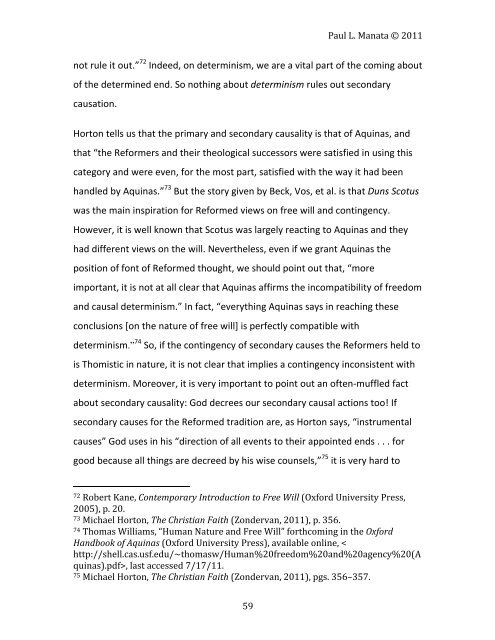Free Will, Moral Responsibility, and Reformed Theology - Analytic ...
Free Will, Moral Responsibility, and Reformed Theology - Analytic ...
Free Will, Moral Responsibility, and Reformed Theology - Analytic ...
Create successful ePaper yourself
Turn your PDF publications into a flip-book with our unique Google optimized e-Paper software.
59<br />
Paul L. Manata © 2011<br />
not rule it out.” 72 Indeed, on determinism, we are a vital part of the coming about<br />
of the determined end. So nothing about determinism rules out secondary<br />
causation.<br />
Horton tells us that the primary <strong>and</strong> secondary causality is that of Aquinas, <strong>and</strong><br />
that “the Reformers <strong>and</strong> their theological successors were satisfied in using this<br />
category <strong>and</strong> were even, for the most part, satisfied with the way it had been<br />
h<strong>and</strong>led by Aquinas.” 73 But the story given by Beck, Vos, et al. is that Duns Scotus<br />
was the main inspiration for <strong>Reformed</strong> views on free will <strong>and</strong> contingency.<br />
However, it is well known that Scotus was largely reacting to Aquinas <strong>and</strong> they<br />
had different views on the will. Nevertheless, even if we grant Aquinas the<br />
position of font of <strong>Reformed</strong> thought, we should point out that, “more<br />
important, it is not at all clear that Aquinas affirms the incompatibility of freedom<br />
<strong>and</strong> causal determinism.” In fact, “everything Aquinas says in reaching these<br />
conclusions [on the nature of free will] is perfectly compatible with<br />
determinism.” 74 So, if the contingency of secondary causes the Reformers held to<br />
is Thomistic in nature, it is not clear that implies a contingency inconsistent with<br />
determinism. Moreover, it is very important to point out an often-‐muffled fact<br />
about secondary causality: God decrees our secondary causal actions too! If<br />
secondary causes for the <strong>Reformed</strong> tradition are, as Horton says, “instrumental<br />
causes” God uses in his “direction of all events to their appointed ends . . . for<br />
good because all things are decreed by his wise counsels,” 75 it is very hard to<br />
72 Robert Kane, Contemporary Introduction to <strong>Free</strong> <strong>Will</strong> (Oxford University Press,<br />
2005), p. 20.<br />
73 Michael Horton, The Christian Faith (Zondervan, 2011), p. 356.<br />
74 Thomas <strong>Will</strong>iams, “Human Nature <strong>and</strong> <strong>Free</strong> <strong>Will</strong>” forthcoming in the Oxford<br />
H<strong>and</strong>book of Aquinas (Oxford University Press), available online, <<br />
http://shell.cas.usf.edu/~thomasw/Human%20freedom%20<strong>and</strong>%20agency%20(A<br />
quinas).pdf>, last accessed 7/17/11.<br />
75 Michael Horton, The Christian Faith (Zondervan, 2011), pgs. 356–357.


